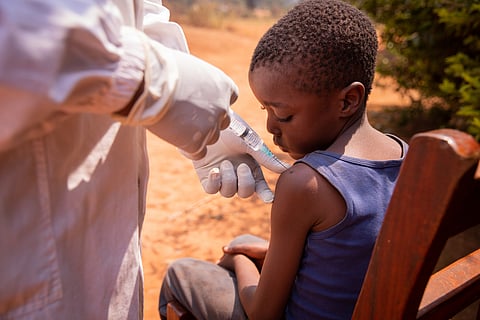

After a long-drawn process and debate on vaccine sovereignty and continental health security, the Global Vaccine Alliance (GAVI) board has fully approved the final structure of the African Vaccine Manufacturing Accelerator (AVMA).
AVMA, which will be launched on June 20, 2024, is a financing mechanism aimed at creating a sustainable vaccine manufacturing industry in Africa. GAVI’s board had partially approved a few of AVMA’s operations last year and had been hammering out the remaining details around the total operationalisation of the financial instrument.
“Following (more than 24) months of close collaboration between GAVI, the African Union and Africa Centres for Disease Control and Prevention (CDC), the Board today approved the establishment of AVMA,” said GAVI in a statement to the press after a high-level meeting in Paris, France.
The communique further explained: “AVMA is an innovative financing mechanism that provides a pathway to sustainability for African vaccine manufacturing, while improving the region’s resilience in the face of pandemics as well as outbreaks and other health emergencies, while being careful not to compromise the health of vaccine markets globally.”
GAVI, the African Union (AU) and Africa CDC have been exploring sustainable financing mechanisms to fully address and implement lessons learnt from the COVID-19 pandemic and the devastating impacts of vaccine inequity / nationalism Africa faced during the global crisis.
During the pandemic, AU expressed displeasure after the continent faced significant challenges due to vaccine inequity, as European countries hoarded the life-saving vaccines. Vaccine nationalism resulted in delayed vaccination rollouts, higher infection and mortality rates and prolonged economic hardships, according to the Africa CDC.
Thus, the approval of final pending details — including legal definitions, an inclusive steering committee, governance processes, monitoring and evaluation mechanisms and clarity on how payments will be made — comes as a huge reprieve to the continent.
In the endorsed AVMA's governance mechanisms, for example, the GAVI board and partners such as AU, Africa CDC, UNICEF, WHO, manufacturers and donors will be included.
The finalisation of AVMA sends an immediate positive signal to investors regarding GAVI's long-term commitment to supporting a sustainable African vaccine manufacturing base and improving the resilience of the African pandemic and outbreak vaccine supply.
“AVMA aims to make up to US$ 1 billion available to manufacturers as a way of helping offset high initial costs of production, and was designed through an extensive consultation process, which involved key partners, donors, industry, civil society and others,” said Manuel Barroso, chair of the GAVI board.
Barroso added that GAVI has been working closely with many other entities, including the G7, G20, donors, civil society, industry and experts to operationalise AVMA fully.
“We have been keen on putting in place innovative mechanisms that have the power to reshape the approach to regional manufacturing and pandemic response that ensures no one is left behind with immunisation,” added Professor Barroso.
The new financial instrument will provide strategically timed grants to support and incentivise African pharmaceutical manufacturers to enter into vaccine production and to help build a broader ecosystem to ensure the sector becomes globally competitive in ways that outlast this initial financial support of roughly $1 billion, according to Gavi.
Africa CDC and AU have welcomed the move, terming it a game-changer in safeguarding the continent’s health security and accelerating the achievement of universal health coverage.
Local manufacturing is the second independence of Africa because it impacts our health security and economic growth.
Jean Kaseya, director-general of Africa CDC
“The upcoming launch of AVMA on June 20 will be an opportunity to reflect on and celebrate the journey toward Africa’s self-reliance in manufacturing vaccines, therapeutics and diagnostics,” he added.
By giving the initiative a clean bill of health, GAVI, as one of the largest purchasers of vaccines in the world, is sending a powerful signal to emerging pharmaceuticals in Africa or foreign entities looking to tap into the African market.
Some experts believe the move indicates that GAVI is ready to consider competitive African-manufactured vaccines within its significant commercial volumes. Other stakeholders also believe that by giving the initiative the greenlight, GAVI is prepared to create conducive conditions for emerging manufacturers, enabling them to be price-competitive in UNICEF tenders.
Amref Health Africa Group Chief Executive Officer (GCEO), Githinji Gitahi, welcomed the move, acknowledging the vital role GAVI plays on the continent. Githinji said the move will ensure better health outcomes and foster economic growth across the continent.
The approval will help mobilise African nations to support the Africa Medicines Agency (AMA), he added. AMA is pivotal in creating an enabling environment for vaccine manufacturing on the continent by providing regulatory oversight, facilitating capacity building and fostering collaboration among stakeholders.
“The GAVI approval is a significant milestone for Africa’s vaccine manufacturing capability, which is rapidly advancing after setting up robust initiatives. For instance, South Africa's Biovac Institute partners with global pharmaceutical companies to produce and distribute vaccines,” said Githinji.
The Institut Pasteur in Dakar, Senegal, is renowned for its yellow fever vaccine production, he pointed out. “Egypt's Vacsera is also expanding its facilities to increase vaccine manufacturing capacity,” he noted, adding that these local initiatives exemplify Africa’s commitment to building a resilient and self-sufficient vaccine supply chain.